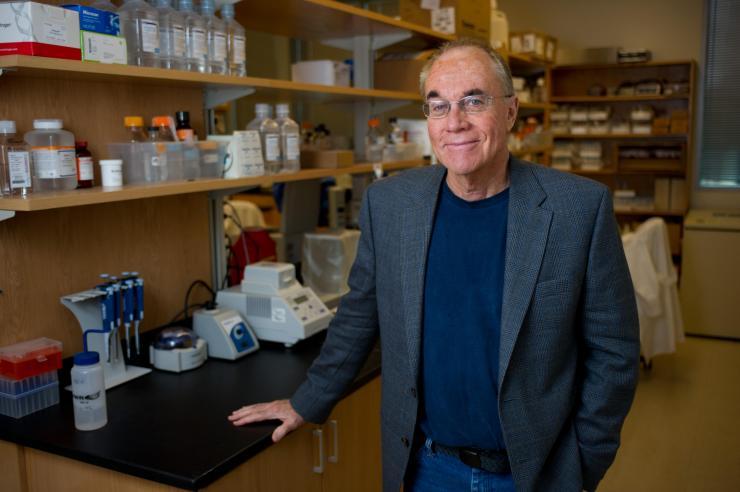McDonald To Be Honored by Georgia Center for Oncology Research and Education (CORE)
Jan 24, 2023 — Atlanta, GA

The Prevent Cancer Foundation has made a significant grant award to Georgia Tech to advance research on detecting ovarian cancer. The work is led by John McDonald, a professor in the School of Biological Sciences. (Credit: Rob Felt, Georgia Tech)
John McDonald, emeritus professor in the School of Biological Sciences and founding director of Georgia Tech’s Integrated Cancer Research Center, has been named one of “Today’s Innovators” in cancer care by the Georgia Center for Oncology Research and Education (CORE).
McDonald, who also served as the chief scientific officer of the Ovarian Cancer Institute, will be honored during the “Toast to the Trailblazers” event that is part of CORE’s 20th Anniversary Celebration, set for Saturday, February 18 of this year, at the Atlanta History Center.
“For me, it's always an honor — and often a surprise! — when I receive an award, as was the case for this award from the Georgia CORE,” McDonald said. “It's certainly encouraging to know that others believe what I'm doing is worthwhile. At the same time,” he added, “I'm acutely aware that nothing in life, and especially in science, is accomplished in isolation. Whatever I've been able to accomplish is, in large measure, because I have had great students and collaborators to work with over the years here at Georgia Tech.”
Also chosen as a “Today’s Innovator” this year is Lynn Durham, CORE’s president and CEO. Before joining CORE in 2021, Durham served as vice president for Institute Relations at Georgia Tech. Across 25 years on campus, Durham also worked as chief of staff and led the Institute’s legislative advocacy program.
Individuals selected as “Today’s Innovators” by CORE have “embraced the original vision of collaboration and advancement throughout the state’s cancer care ecosystem and are working today to continue to enhance cancer research and exceptional care for all Georgians.”
Durham noted that McDonald was chosen because of his past leadership of Georgia Tech’s Integrated Cancer Research Center and his scholarship in ovarian cancer detection and treatment.
“He is the leader of a cancer research center in one of our state’s most respected higher education institutions, and I hope this recognition will demonstrate the important connection between basic science and the remarkable innovations in cancer care during the past 20 years,” Durham added.
McDonald is engaged in translational research, which seeks to quickly move more basic science discoveries into actual practice to help patients. The challenge, McDonald explained, is how to best get those discoveries and technologies into clinical practice. This requires connections between research scientists, clinicians, and appropriate patients. While the scientist/clinician connection is relatively easy to establish at medical schools, it is not as easy for researchers at non-medical schools like Georgia Tech, he added.
“The Georgia CORE was designed to address these challenges by facilitating connections between scientists and clinicians while at the same time providing Georgia citizens access to the latest trials,” McDonald said. “These efforts have been tremendously successful over the last 20 years.
“I have tried to play some role in improving communication and encouraging collaboration among Georgia Tech researchers doing cancer-relevant research,” McDonald added, “by establishing the Integrated Cancer Research Center (ICRC) and connecting our scientists and engineers with clinicians, all with the assistance of the Georgia CORE.”
McDonald became an emeritus professor in January 2023. Now, he’s focused on writing a book, and still working to get discoveries made in his lab into clinical practice. For that effort, McDonald has established startup companies with two colleagues in the School of Biological Sciences, postdoctoral researcher Nick Housley and Jeffrey Skolnick, who serves as Regents' Professor, Mary and Maisie Gibson Chair, and as a Georgia Research Alliance Eminent Scholar in Computational Systems Biology.
“One effort is focused on a drug delivery nanoparticle, and the other is focused on our machine learning-based personalized diagnostic tool,” McDonald said. “Collaboration with Georgia CORE is proving essential in moving both of these projects forward into clinical trials.”

Lynn Durham
Writer: Renay San Miguel
Communications Officer II/Science Writer
College of Sciences
404-894-5209




